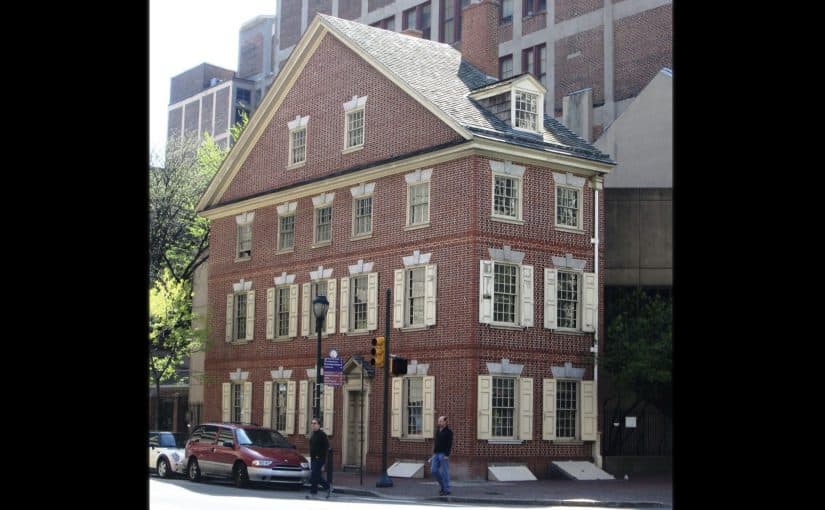Principles of Liberty: Ten Biblical Truths Embedded in the Declaration of Independence
A Five-Session Bible Study
Teaching Plan for Session 1
The Reality and Authority of Nature’s God
In this series of Bible studies, we are exploring ten Christian elements in the Declaration of Independence, ten ideals that are thoroughly biblical but not always recognized as such in our day. In fact, modern non-Christian influences have so redefined and reinterpreted words and concepts that in some cases, contemporary Americans completely misunderstand what the Founders intended. A Word Foundations article titled “Principles of Liberty” is foundational to this series.

A PDF file of the above graphic is available here. A Bible study series overview is available here.
It’s high time we rediscover the true meaning of these principles and that we contend anew for them as the Founders understood them. In our study, we’re highlighting words and phrases from the most quoted portion of the Declaration, then demonstrating how they’re linked to Scripture and to biblical truth. In each session we’ll consider two principles until we’ve studied all ten.
Here are the principles we will examine in Session 1.
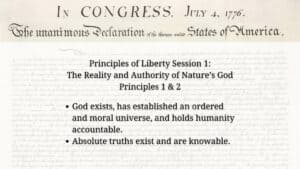
A PDF file of this slide is available here.
- Read the background information for the session. Be aware it provides more information than you will use in the session.
- Summarize the content of the Overview section from the article providing background information.
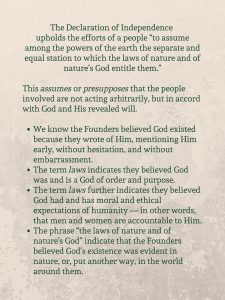 Explain that the Declaration of Independence upholds the efforts of a people “to assume among the powers of the earth, the separate and equal station to which the Laws of Nature and of Nature’s God entitle them.”
Explain that the Declaration of Independence upholds the efforts of a people “to assume among the powers of the earth, the separate and equal station to which the Laws of Nature and of Nature’s God entitle them.”- Say: The phrase “the Laws of Nature and of Nature’s God” is extremely important. We’ll explore it, and as we do, we’ll highlight the first two principles on our list. You may find it helpful to use the above graphic, a PDF of which is available here.
- Emphasize the first principle, that in the Declaration the Founders implicitly affirmed that “God exists, has established an ordered and moral universe, and holds humanity accountable.”
- Divide the class into four groups. Ask each group to appoint a willing leader or facilitator (no one should be forced). Hand out discussion guides to each group— group 1, group 2, group 3, and group 4. Each group member should receive a copy of the discussion guide used in his or her particular group. Permission is granted to reproduce these resources for the educational purposes for which they are designed.
- Give groups 10-15 minutes to read their discussion guides and to talk about the insights highlighted in them. Questions and other discussion starters are provided at the bottom of each discussion guide.
- After adequate time for interaction has passed, allow each group to let its facilitator or another spokesperson report to the class the insights that were discussed and discovered. As the main leader/facilitator, you can introduce each group and transition from group to group by sharing with the entire class the theme or idea each group was assigned to discuss. Or you may wish to ask the leader of each group to share what that theme was.
- The members of group 1 talked about how the Bible assumes God’s existence. Allow the group to share.
- The members of group 2 discussed this insight: Nature’s ordered structure points to a God of precision and purpose.
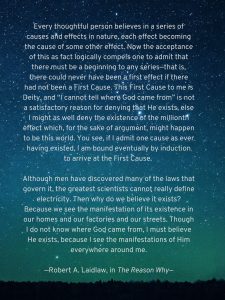 After group 2 has had a chance to share with the class, read and, if desired and if time allows, briefly discuss this quote from Robert A. Laidlaw. A PDF file of this graphic is available here.
After group 2 has had a chance to share with the class, read and, if desired and if time allows, briefly discuss this quote from Robert A. Laidlaw. A PDF file of this graphic is available here.- Explain that group 3 talked about this statement: The Bible assumes God’s existence, but it does more. It also points to evidence for His existence. Allow a spokesman from group 3 to report.
- Group 4 examined the idea that people are accountable to God. Give a spokesperson from group 4 a chance to report.
- Say: It is clear that the Founders of the United States of America “got it.” They affirmed what nature declares about God and God’s character. We need to rediscover their perspective today.
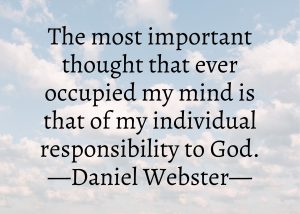 Share that Daniel Webster (1782-1852) who was born a short time later than the Founders, said, “The most important thought that ever occupied my mind is that of my individual responsibility to God.” A PDF file of this graphic is available here.
Share that Daniel Webster (1782-1852) who was born a short time later than the Founders, said, “The most important thought that ever occupied my mind is that of my individual responsibility to God.” A PDF file of this graphic is available here.- Review: So, we see in Scripture, and embedded in the Declaration of Independence as well, this truth: God exists, has established an ordered and moral universe, and holds humanity accountable.
- Move on by highlighting the second principle: Absolute truths exist and are knowable.
- Summarize, read, or role play with a participant either Alan’s Journey or A Rabbi’s Experience, whichever you prefer. Use it to emphasize that everyone has an innate sense of morality and ethics and intuitively knows the difference between right and wrong.
- If you haven’t already, read Romans 2:12-16 in the NIV, and briefly discuss what the phrase “written on their hearts” means. (Notice that this passage is included on page 2 of “A Rabbi’s Experience.”)
- Review: Emphasize that the phrase “the Laws of Nature and of Nature’s God” assumes the affirmations of both Principle 1 and Principle 2: “God exists, has established an ordered and moral universe, and holds humanity accountable,” and “Absolute truths exist and are knowable.”
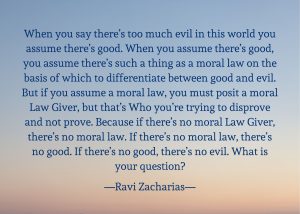 Share this quote from Ravi Zacharias to emphasize how clear it is that people intuitively know about God and His laws (just as the Declaration of Independence implicitly affirms). A PDF file of this graphic is available here, and an important disclaimer here. As an alternative, you may wish to use this quote (PDF file here) from apologist, speaker, and author Greg Koukl.
Share this quote from Ravi Zacharias to emphasize how clear it is that people intuitively know about God and His laws (just as the Declaration of Independence implicitly affirms). A PDF file of this graphic is available here, and an important disclaimer here. As an alternative, you may wish to use this quote (PDF file here) from apologist, speaker, and author Greg Koukl.- If time allows, share these quotes with participants. John Quincy Adams, the sixth president of the United States, said, “There are three points of doctrine the belief of which forms the foundation of all morality. The first is the existence of God; the second is the immortality of the human soul; and the third is a future state of rewards and punishments. Suppose it possible for a man to disbelieve either of these three articles of faith and that man will have no conscience, he will have no other law than that of the tiger or the shark. The laws of man may bind him in chains or may put him to death, but they never can make him wise, virtuous, or happy”
- Also, you may wish to note that Founding Father Samuel Adams declared, “[N]either the wisest constitution nor the wisest laws will secure the liberty and happiness of a people whose manners are universally corrupt. Here therefore is the truest friend to the liberty of his country who tries most to promote its virtue, and who, so far as his power and influence extend, will not suffer a man to be chosen into any office of power and trust who is not a wise and virtuous man.”
- Let’s review: Remind participants that you’ve been exploring the first and second principles on our list: • 1) God exists, has established an ordered and moral universe, and holds humanity accountable. • 2) Absolute truths exist and are knowable.
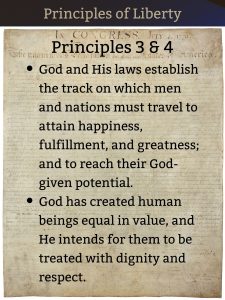 Looking ahead: Share with participants that next time, you will examine the third and fourth principles on the list. The theme of these two principles is the relationship of God’s laws to human happiness and human worth. A PDF file of this graphic is available here.
Looking ahead: Share with participants that next time, you will examine the third and fourth principles on the list. The theme of these two principles is the relationship of God’s laws to human happiness and human worth. A PDF file of this graphic is available here.
-
- God and His laws establish the track on which men and nations must travel to attain happiness, fulfillment, and greatness; and to reach their God-given potential.
- God has created human beings equal in value, and He intends for them to be treated with dignity and respect.
Assignment: Ask participants to visit the Word Foundations website at www.wordfoundations.com. Say: On the menu on the left, the 3 items listed right above the Subscribe boxes are
-
-
- “The Bible and Free Enterprise, Part 1,”
- “The Bible and Free Enterprise, Part 2,” and
- “The Bible and Free Enterprise, Part 3.”
-
Ask participants to visit the site and to click on Part 1 and read it for next time. It might be helpful to explain that the free enterprise system rests on the freedoms the Founders upheld in the Declaration. We need to learn how the principles of a free market economic model align with biblical truth. (You can access all the articles in this series from this page.)
Close in prayer. Pray that Americans, especially the members of your large group, will rediscover and reapply on both personal and national levels what the Founders knew: That God and His laws are real, and that all people are accountable to Him.
Copyright © 2020 by B. Nathaniel Sullivan. All rights reserved.
top image credit: “Declaration House,” the reconstructed boarding house at Market and S. 7th Street where Jefferson wrote the Declaration
Unless otherwise indicated, Scripture has been taken from the New King James Version®. Copyright © 1982 by Thomas Nelson, Inc. Used by permission. All rights reserved.
The Scripture reference marked NIV has been taken from The Holy Bible, New International Version®, NIV® Copyright © 1973, 1978, 1984, 2011 by Biblica, Inc.® Used by permission. All rights reserved worldwide.
